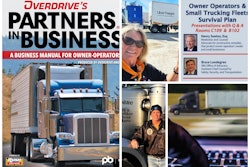A California judge on Friday, March 15, ruled against the trucking industry in its effort to halt the state’s application of the restrictive AB 5 independent contractor law on trucking, ultimately ruling that truckers should make their case legislatively rather than judicially.
The AB 5 law, of course, has been in effect in California since January 2020 and under fire from trucking associations and their membership all along. The law codifies the ABC test for worker classification and effectively bans the traditional leased owner-operator model.
Under the ABC test, a worker has to meet all three conditions of the test to be classified as an independent contractor. Particularly problematic for trucking is the “B” condition, which requires that the worker’s tasks be “outside the usual course of business of the company” they are contracting with to be a valid independent contractor.
[Related: California Trucking Association again seeks injunction to block AB 5]
On Friday, California District Judge Roger Benitez, who previously has been on trucking’s side in the case (he was the judge who initially gave trucking its preliminary injunction on New Year’s Eve 2019 to block the law’s enforcement in trucking), denied the California Trucking Association’s and Owner-Operator Independent Drivers Association’s latest request for injunction.

OOIDA said in a statement Monday morning that it “disagrees with Judge Benitez's ruling and the reasoning behind it, and is exploring all options moving forward -- including an appeal." CTA has yet to respond for a request for comments. Transportation law firm Scopelitis noted that it expects CTA to appeal Benitez's decision, but "there will be no relief from AB 5 in the meantime."
The original preliminary injunction, Benitez said in his most recent ruling, “was entered based upon the preliminary conclusion that AB 5 was preempted by the Federal Aviation Administration Authorization Act,” or F4A.
The state of California, along with the International Brotherhood of Teamsters, appealed the ruling, and the Court of Appeals reversed the injunction, finding that AB 5 was not preempted by the F4A. CTA and OOIDA then filed renewed motions for a preliminary injunction.
[Related: Remaining legal challenges to AB 5 'an uphill climb,' enforcement light thus far]
In the renewed claims, CTA and OOIDA re-alleged that F4A preempted AB 5, that there is implied preemption of AB 5, that AB 5 is a violation of the Dormant Commerce Clause of the U.S. Constitution, and that it violates the Equal Protection Clause of the Constitution “by creating irrational or animus-based classifications,” Benitez said.
On the first claim of AB 5’s explicit preemption by the F4A, Benitez noted the ruling was resolved earlier in this case. The courts previously found that AB 5 “is not significantly related to rates, routes, or services,” and therefore isn’t preempted by the F4A.
On the related argument that the F4A implicitly preempts AB 5, Benitez said California’s law doesn’t make it “impossible for truck drivers to comply with both federal and state law because there is simply no federal standard of classification requiring compliance. The [F4A] does not dictate that truck drivers must be classified as independent contractors or that drivers are not subject to state wage and hour laws.”
CTA and OOIDA also claimed implied preemption because AB 5 creates a “patchwork quilt of national regulations.” Benitez disagreed, noting that the “particular regulations about which Congress is concerned are those addressing carrier prices, routes, and services. Congress does not appear to be concerned with a patchwork quilt of truck driver classifications for purposes of wage and hour protection.”
[Related: California Trucking Association tears down Solicitor General’s AB 5 argument]
On the claim that AB 5 violates the Constitution’s Dormant Commerce Clause, Benitez said CTA and OOIDA aren’t arguing that AB 5 was designed to discriminate in favor of in-state workers and against out-of-state workers, but rather that it is the “effect of AB 5 that offends the Dormant Commerce Clause.” They argued, Benitez said, that “AB 5’s burdens on interstate commerce outweigh the local benefits.”
Benitez concluded that “AB 5 does not offend the core constitutional principle of prohibiting purposeful discrimination against interstate commerce. ... And while AB 5 has economic effects, the effects do not confirm purposeful discrimination against interstate commerce in the design of AB 5.”
Finally, CTA and OOIDA argued that AB 5 violates the Equal Protection Clauses of the U.S. and California constitutions. On one claim, they alleged that the employee classifications targeting carriers and owner-operators were motivated by animus, based on comments by AB 5 legislative sponsor Assemblywoman Lorena Gonzalez.
The groups highlighted a statement she made on the Assembly floor on Sept. 11, 2019, that one purpose of AB 5 was to “get rid of an outdated broker model that allows companies to basically make money and set rates for people that they call independent contractors.” The groups also made note of a Tweet from Gonzalez on Nov. 21, 2019, about how AB 5 would permit a trucker to “work as an independent contractor for a construction firm,” while requiring an owner-operator to “work as an employee for a trucking company,” referencing an exemption for construction industry drivers that Benitez said is set to expire at the end of 2024.
“Yet, the statements of a single legislator do not necessarily represent the reasons motivating other legislators who vote to pass a bill into law,” Benitez said.
Ultimately, Benitez ruled in favor of California and the Teamsters on all four claims made by CTA and OOIDA.
“Remedying complexities and perceived deficiencies in AB 5 are the kind of work better left to the soap box and the ballot box than to the jury box,” Benitez concluded. “If sufficient political or economic pressure can be brought to bear by Plaintiffs and their supporters, the more onerous provisions of the statute can be amended. The courts, on the other hand, are not the proper bodies for imposing legislative amendments.”
[Related: Supreme Court will not hear trucking's AB 5 case, law will take effect for industry]











